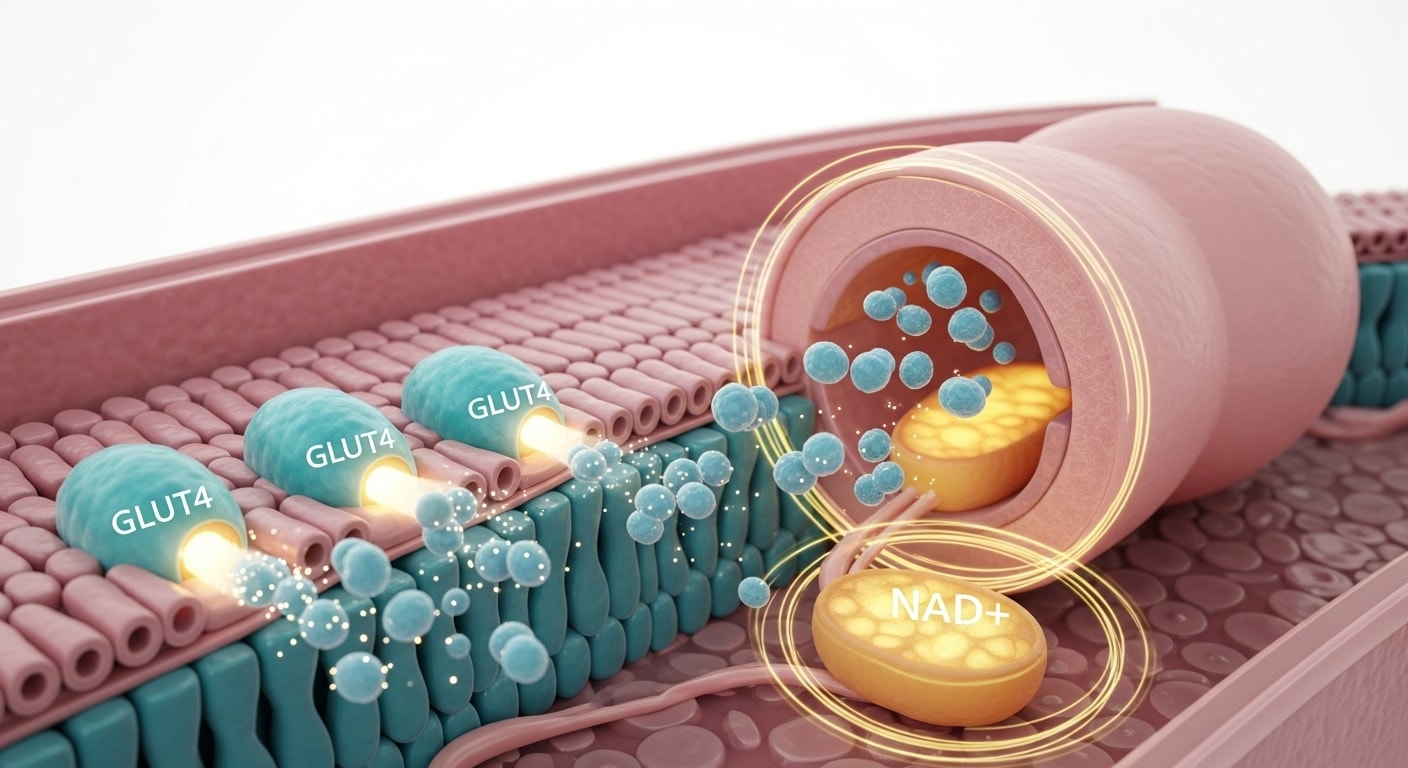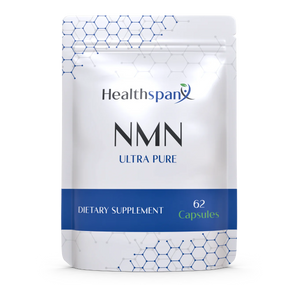Does NMN Lower Blood Sugar? Benefits & Clinical Evidence | HealthspanX

NMN Diabetes: Does NMN Lower Blood Sugar?
Yes, NMN (nicotinamide mononucleotide) has been shown to lower blood sugar by improving insulin sensitivity, enhancing glucose uptake in fat tissue, and increasing NAD+ levels in both animal and human studies.
NAD+ is essential for countless biological processes, including the regulation of insulin sensitivity, mitochondrial function, and the maintenance of healthy blood glucose levels. NAD+ is also involved in various biological pathways and signal transduction processes that regulate metabolic health.
NMN does not act like a traditional diabetes drug. Instead of directly lowering blood glucose, it works by rejuvenating the body’s ability to use insulin and metabolize sugar properly. As NAD+ levels decline with age, mitochondrial dysfunction and age related disorders are linked to reduced NAD+ levels.
This article reviews evidence from both clinical and preclinical studies showing how NMN improves glycemic control. We talk about inflammation, improved glucose uptake in adipose tissue, and greater pancreatic insulin secretion. Previous studies have demonstrated the metabolic effects of NMN on key metabolic organs such as the liver, skeletal muscle, and adipose tissue.
Let’s explore how NMN does all this through its action on fat tissue, mitochondria, inflammation, and insulin regulation.
Introduction To NMN
Nicotinamide mononucleotide (NMN) is a naturally occurring molecule that has become a focal point in the field of metabolic health and longevity research. As a direct precursor to nicotinamide adenine dinucleotide (NAD+), NMN plays a vital role in supporting the body’s energy metabolism, glucose homeostasis, and lipid metabolism. NAD+ is essential for countless biological processes, including the regulation of insulin sensitivity and the maintenance of healthy blood glucose levels.
With age, NAD+ levels naturally decline, which can contribute to the onset of age-related diseases such as type 2 diabetes. NMN supplementation has emerged as a promising strategy to counteract this decline, as it helps restore NAD+ concentrations in various tissues. By boosting NAD+, NMN can enhance insulin sensitivity, reduce insulin resistance, and improve glucose metabolism, particularly in skeletal muscle. These effects are crucial for maintaining optimal insulin levels and supporting overall metabolic health.
Recent studies have shown that NMN supplementation not only benefits blood glucose regulation but also supports broader aspects of human metabolism. By targeting the underlying mechanisms of metabolic dysfunction, NMN offers therapeutic potential for individuals at risk of or living with age-related metabolic disorders.
Does NMN Raise Insulin Levels In Humans?
In human studies, NMN increases insulin secretion after meals without raising blood sugar, suggesting better glucose control.
A 2023 clinical trial from Osaka University gave eleven healthy adults 250 mg of NMN daily in the morning for 3 months. Researchers found that NMN raised insulin levels after meals (within 2 hours) as follows:
-
2 months of NMN treatment: insulin levels after meals raised by 5 folds.
-
3 months of NMN treatment: insulin levels after meals raised by 4 folds.
The study measured blood serum insulin levels and observed a significant increase after NMN supplementation. The increase in insulin levels reached statistical significance according to the researchers, confirming the reliability of the results. And while the insulin level had increased, the blood sugar levels stayed consistent).

Insulin is the compound that helps in lower blood sugar levels. Therefore, NMN’s ability to increase the levels of insulin without raising blood glucose levels suggests that it may be able to help with diabetes. NMN supplementation led to more insulin being secreted after meals, which may help prevent diabetes.
These findings suggest NMN improves postprandial (after-meal) insulin response without hypoglycemia, a hallmark of metabolic resilience.
NMN Helps Lower Insulin Resistance And Improve Glucose Metabolism In Diet And Age-Induced Diabetes In Mice
Yes, in animal models of type 2 diabetes, NMN restores insulin sensitivity and lowers blood sugar levels by boosting NAD+ and reversing metabolic dysfunction.
In a study, diabetic mice were treated with NMN according to body weight (500 mg/kg) for 10 days. Both male and female mice were included in the study to assess sex-specific responses. Plasma concentrations of NMN were measured to assess NMN levels after supplementation.
NMN restored NAD+ levels in the liver. Notably, NMN treated (HFD) mice showed significant improvements in NAD+ biosynthesis in target tissues such as liver and adipose tissue. It also significantly improved glucose tolerance, and insulin sensitivity in the liver).
That’s really important because whenever we eat something, it produces excess glucose in the body, and that excess glucose needs to be stored somewhere. That's where pancreatic β cells and insulin come in.

Insulin converts excess glucose to glycogen and helps safely stow it away in the liver. NMN improved glucose utilization and modulated immune response and stress response pathways in metabolic organs. When people develop diabetes, this mechanism gets disrupted due to insulin resistance. This is a phenomenon where your body stops responding to insulin. As a result, excess glucose cannot be converted into glycogen and this raises blood glucose levels.
Expression levels of key genes were significantly upregulated in response to high fat diet, but improved with NMN treatment. NMN’s ability to improve insulin sensitivity suggests that it may be able to revitalize your liver’s glucose metabolism by making it more receptive to insulin.
Adipose Tissue And NMN
Adipose tissue, commonly known as body fat, is more than just an energy reservoir—it is a dynamic metabolic organ that plays a central role in regulating energy metabolism and insulin sensitivity. Dysfunction in adipose tissue is closely associated with the development of insulin resistance and type 2 diabetes.
Research indicates that NMN supplementation can significantly improve the function of adipose tissue. By increasing NAD+ levels, NMN enhances the ability of adipocytes (fat cells) to respond to insulin, leading to improved glucose uptake and better regulation of blood sugar.
These beneficial effects of NMN on adipose tissue function highlight its potential as a therapeutic agent for improving insulin sensitivity and combating metabolic disorders.
Does NMN Supplementation Work Better Than Other Nad+ Boosters For Diabetes?
NMN might be more efficient at raising NAD+ and improving metabolic markers than other precursors like NR.
NR needs to be converted to NMN before it can form NAD+. On the other hand, NMN can directly lead to the production of NAD+.
And scientists recently found that NMN can directly enter cells directly via the Slc12a8 transporter - a mechanism confirmed in mouse intestines. Think of Slc12a8 like a VIP door for NMN to enter the club. This transporter mechanism has also been observed in mammalian cells, suggesting that NMN supplementation may support improved muscle function and metabolic regulation by enhancing NAD+ availability in muscle tissue.
This means that NMN, when absorbed, might be more efficient at raising NAD+ levels compared to NR.
Is NMN Safe For People With Blood Sugar And Insulin Sensitivity Concerns?
Yes, NMN has been proven safe in both healthy individuals and those with metabolic risks like prediabetes.
Yamane study reported no adverse effects, even among individuals with unusually high NMN absorption. NMN supplementation has also been associated with improvements in blood pressure in some clinical studies, supporting its cardiovascular safety profile.
Moreover, a randomized controlled trial in overweight women with prediabetes showed that 250 mg/day of NMN for ten weeks improved skeletal muscle insulin sensitivity without altering fasting glucose levels.
This suggests that even for people living with complex metabolic disorders like diabetes or pre-diabetes, NMN is still safe to administer in a controlled amount.
Final Thoughts: NMN Diabetes - Does NMN Lower Blood Sugar?
Yes—scientific evidence from both human and animal studies shows that NMN helps lower blood sugar by improving insulin function, NAD+ levels, and inflammation. However, further investigation is needed to fully understand the long-term effects and broader health implications of NMN supplementation.
Rather than forcing blood sugar down like a pharmaceutical, NMN strengthens the body’s natural metabolic control system. It restores insulin sensitivity, which is critical for long-term glucose regulation.
NMN’s mechanism involves modulating insulin signaling across liver, fat, and muscle. These multi-tissue effects create a synergistic foundation for glucose homeostasis.
If you are serious about improving your energy, blood sugar, and cellular resilience—NMN may be worth considering.
Clinical doses of NMN typically range from 250–500 mg/day, while food sources offer only trace amounts. However, achieving a dose of 250 mg/day might be difficult without Ultra Pure NMN™. To support your metabolic health with precision, consider a pharmaceutical-grade NMN supplement that meets the standards used in clinical trials.
References
-
Yoshino, J., Mills, K. F., Yoon, M. J., & Imai, S. (2011). Nicotinamide mononucleotide, a key NAD(+) intermediate, treats the pathophysiology of diet- and age-induced diabetes in mice. Cell metabolism14(4), 528–536. https://doi.org/10.1016/j.cmet.2011.08.014
-
Cohen, P., Nimmo, H. G., & Proud, C. G. (1978). How does insulin stimulate glycogen synthesis?. Biochemical Society symposium, (43), 69–95.
-
Freeman, A. M., Acevedo, L. A., & Pennings, N. (2023). Insulin Resistance. In StatPearls. StatPearls Publishing.
-
Alegre, G. F. S., & Pastore, G. M. (2023). NAD+ Precursors Nicotinamide Mononucleotide (NMN) and Nicotinamide Riboside (NR): Potential Dietary Contribution to Health. Current nutrition reports12(3), 445–464. https://doi.org/10.1007/s13668-023-00475-y
-
Grozio, A., Mills, K. F., Yoshino, J., Bruzzone, S., Sociali, G., Tokizane, K., Lei, H. C., Cunningham, R., Sasaki, Y., Migaud, M. E., & Imai, S. I. (2019). Slc12a8 is a nicotinamide mononucleotide transporter. Nature metabolism1(1), 47–57. https://doi.org/10.1038/s42255-018-0009-4
-
Yoshino, M., Yoshino, J., Kayser, B. D., Patti, G. J., Franczyk, M. P., Mills, K. F., Sindelar, M., Pietka, T., Patterson, B. W., Imai, S. I., & Klein, S. (2021). Nicotinamide mononucleotide increases muscle insulin sensitivity in prediabetic women. Science (New York, N.Y.)372(6547), 1224–1229. https://doi.org/10.1126/science.abe9985
-
Poljšak, B., Kovač, V., Špalj, S., & Milisav, I. (2023). The Central Role of the NAD+ Molecule in the Development of Aging and the Prevention of Chronic Age-Related Diseases: Strategies for NAD+ Modulation. International journal of molecular sciences, 24(3), 2959. https://doi.org/10.3390/ijms24032959
-
Cohen, P., Nimmo, H. G., & Proud, C. G. (1978). How does insulin stimulate glycogen synthesis?. Biochemical Society symposium, (43), 69–95.
-
Freeman, A. M., Acevedo, L. A., & Pennings, N. (2023). Insulin Resistance. In StatPearls. StatPearls Publishing.
-
Burhans, M. S., Hagman, D. K., Kuzma, J. N., Schmidt, K. A., & Kratz, M. (2018). Contribution of Adipose Tissue Inflammation to the Development of Type 2 Diabetes Mellitus. Comprehensive Physiology, 9(1), 1–58. https://doi.org/10.1002/cphy.c170040
-
Hiroshige, S., Kajimura, Y., Nagao, Y., Taguchi, A., Hatanaka, R., Yodokawa, C., Fujioka, Y., Akiyama, M., Tanizawa, Y., & Ohta, Y. (2025). Single bolus injection of nicotinamide mono nucleotide increases systemic insulin sensitivity in association with activation of NAD salvage pathway in the liver and adipose tissue in mice. Endocrine journal, 72(9), 1051–1060. https://doi.org/10.1507/endocrj.EJ24-0312


